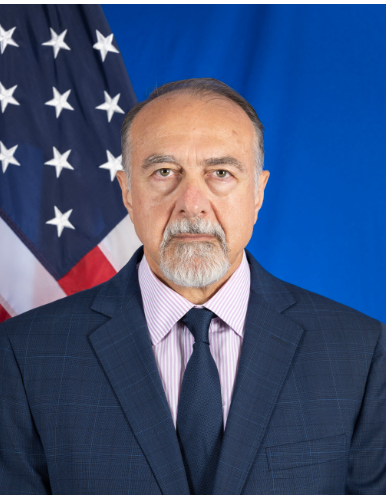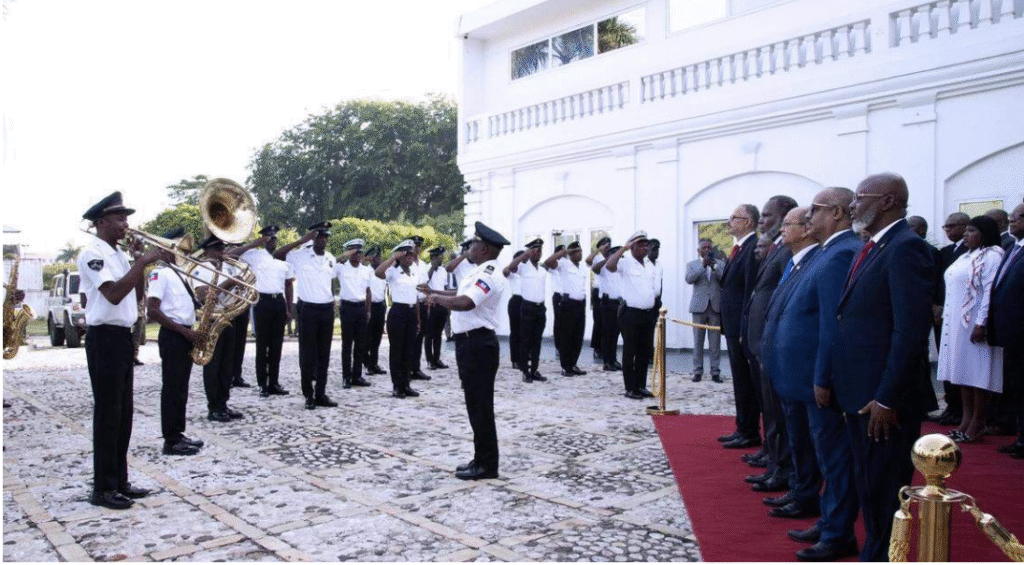PORT-AU-PRINCE — Haiti’s transitional government has officially put an end to efforts to draft a new constitution, as leaders returned to the National Palace for the first time since armed gangs forced the government to abandon downtown Port-au-Prince.
The decision by the Transitional Presidential Council came Thursday during a Council of Ministers meeting at the National Palace. The government last held such a gathering there in January 2024 under then-prime minister Ariel Henry, who was forced to resign a month later by Washington as gangs launched coordinated attacks across the capital.
As leaders of the presidential panel and current Prime Minister Alix Didier Fils-Aimé met inside Thursday, automatic gunfire could be heard on the Champ-de-Mars, the sprawling public square bordering the palace grounds.
“They have finally come to their senses and realized they could not embark themselves and the country on an illegal and hazardous path. All that money spent in vain,” said Bernard Gousse, a lawyer and former justice minister who chaired a Port-au-Prince Bar Association committee that recently issued a scathing report on the draft constitution.
The proposal had been spearheaded by a steering committee of the National Conference. The lawyers’ committee argued the process was illegal because it violated the provisions of the 1987 Constitution for how it can be amended, and because the steering committee had failed to meet with various social, political and professional groups to get public input and buy-in, even though that was supposed to be part of their procedures.
The lawyers and others also pointed out that on the day the nine members of the transitional presidential council took office in April 2024, rather than declare the Constitution to be void and declare the country to be in a transition, they took an oath on the Constitution and vowed to uphold it.
On Thursday, the mandate of the steering committee was terminated. The mandate of the Provisional Electoral Council also was amended to remove the need for the agency to organize a referendum to vote on a new constitution. The Council of Ministers also adopted a delayed 2025-26 budget for the country.
For months, the initiative to draft a new constitution had been mired in controversy, with political leaders, legal experts and constitutional scholars questioning the legitimacy of the process and the contents of the proposed draft. Among the most contentious issues: The draft reduced the power of Parliament, introduced a new office of vice president and created regional governors with open-ended terms, potentially making them more powerful than the president, who would be limited to two five-year terms..
Haitians living in the U.S. also objected because they were they left out of the process. They also argued that if the measure was pursued, Haiti would find itself in a new constitutional crisis.
In January, a group spearheaded by former parliamentarian Jerry Tardieu, and charged by the steering committee to get public input, stated it faced “numerous challenges” doing so due to Haiti’s gang crisis.
“The closure of Port-au-Prince airport, the isolation of the capital and the continued deterioration of security prevented the group from traveling to the provinces for important departmental meetings and consultations abroad with the diaspora —as originally anticipated,” the Working Group on the Constitution said after submitting its report, recommending a constituent assembly be put in place ahead of any referendum.
The group also noted that mounting political tensions and the widespread growing violence “created a heavy atmosphere not conducive to a serene and constructive dialogue on the constitution.”
Foreign diplomats and Haitian leaders have all laid blame for the country’s instability on its 1987 Constitution, which was drafted after the fall of the Duvalier family dictatorship and which failed to respond to the crisis Haiti found itself in when President Jovenel Moïse was assassinated on July 7, 2021. Moïse had failed to hold timely elections, leaving Haiti with only 10 elected officials, all members of the Senate, throughout the country at the time of his death.
Others have argued that while some constitutional provisions — like a burdensome governance structure and staggered elections — need amending, the cause of Haiti’s instability is not the document but the failure of politicians to enforce it.

Members of the transitional government had little to say publicly after receiving copies of the draft constitution from the steering committee. Privately, they had concerns and debated how they would discard the project. It wasn’t until the U.S. Embassy’s Chargé d’Affaires Henry Wooster earlier this month posted a pointed message in a video on X that Haitian leaders decided to finally make a decision.
In the message, Wooster called on Haiti’s transitional council and government to “fully fulfill their role by proposing a concrete plan, with a timetable for elections and political transition.”
His failure to mention the constitutional referendum, which some countries just last month has referred to in public comments at the Organization of American States, was widely interpreted as a quiet endorsement by Washington to abandon the controversial push.
During a press conference ahead of the United Nations Security Council vote for a new “Gang Suppression Force” for Haiti, Wooster said Haitians need to have elections to choose a new president. Questions about security, elections and the constitution must not be allowed to be “a red herring for taking action,” he said.
“In other words, you can’t stay in those jobs for life,” Wooster said, referring to the Transitional Presidential Council as well as members of the current government.
Wooster acknowledged that there have been obstacles to holding elections in Haiti, which increasingly looks like it will not have a newly elected president in office before the mandate of the presidential council expires on February 7, 2026.
“The obstacles have ranged the spectrum from security crisis or crises, a refusal on the part of some members of the Transitional Presidential Council to act, to move, and a nettlesome matter of the Constitution,” he said during the September 24 press conference on advancing U.S. foreign policies priorities in Haiti. “The question is do Haitians have to fix the Haitian Constitution before they can have a legitimate election? Or, do they have to fix the Constitution to have a credible… elected head of state, or can it wait?”
The U.S. diplomat emphasized that Haiti, which last held general elections in 2016 and last had an elected president in July 2021, needs to have “a democratically elected head of state.”
“That must happen,” said Wooster. “The question on whether or not, how, the particulars of the Constitution, that’s a matter for Haiti to decide.”
By JACQUELINE CHARLES/Miami Herald



